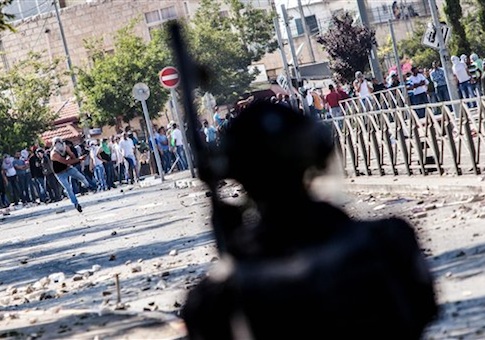JERUSALEM—As an uneasy ceasefire settles over the Gaza Strip, a cascade of anger is coursing through the West Bank and East Jerusalem, raising fears of a third Intifada, or Palestinian uprising.
Police have detained 740 alleged rioters in East Jerusalem in the past three months, 260 of them minors, some as young as 13. So prevalent have youths been in the disturbances, which involve stone throwing and firebombs, that some have dubbed it "the Kid’s Intifada."
It was the murder of a 16-year-old Palestinian living in East Jerusalem, Mohammed Abu Khdeir, on July 2 by three Israeli extremists that has lent the current turmoil its particular vehemence. In the wake of the murder in the upscale Arab neighborhood of Shuafat, riots spread through all Arab neighborhoods in the city, including ones that are normally peaceful. Residents mounted neighborhood patrols to guard against extremists snatching youths from the street as Abu Khdeir had been. The large proportion of youths in the riots is seen as an expression of identification with the local teenage victim.
The murderers, who were arrested a few days after the killing, said they had carried out the act in revenge for the killing of three Israeli youths by Hamas operatives on the West Bank. They killed Abu Khdeir in a Jerusalem forest the day after the bodies of the three Israelis were found.
Enraged Arab demonstrators vented their fury on a light-rail line that ran through Shuafat. Trains passing through the neighborhood were attacked with firebombs and rocks, and the line’s infrastructure was badly damaged. The municipality had proudly inaugurated the rail line just three years before from one end of the city to the other, declaring it a symbol of the reunited Jewish and Arab sectors of the city.
The murder of Abu Khdeir was only one of the ingredients in the current turmoil. Jewish-Arab tensions began with the kidnapping of the three Israeli youths in June and the massive search carried out by security forces before their bodies were found a month later. The arrest of Hamas operatives on the West Bank during the search increased the tension and the outbreak of war in Gaza further hastened the alienation. The daily casualty lists from Gaza and the pictures of destruction there led to riots throughout the West Bank. These were contained by para-military border police but little noticed by most Israelis intent on events in Gaza. Nine Palestinians were killed on the West Bank during this period.
The murder in Shuafat shifted the focus of street violence to East Jerusalem, other West Bank cities remaining relatively quiet during this post-Gaza War period. The anger in Jerusalem is exacerbated by the fact that some 2,000 right-wing Israelis have moved into Arab areas in East Jerusalem rather than into Jewish neighborhoods in East Jerusalem. The Arab neighborhoods have been unwilling to receive them. During the current unrest, the Jewish inhabitants of these enclaves travel in convoy and are the regular targets of rocks and firebombs.
The riots have knocked the bottom out of the tourist industry in the city, one of its major economic underpinnings. Israel hotel occupancy fell over the summer from a normal 80 percent to below 40 percent. This also affects the livelihood of thousands of Jerusalem Arabs who are employed in the hotels.
The First Intifada, which broke out in 1987, was a mass protest against the Israeli occupation, but involved little gunfire and petered out when Israel and the Palestinians began peace talks a few years later. The Second Intifada, which broke out in 2000, was a very violent affair involving suicide bombers and was backed by Palestinian leader Yasser Arafat. The current Palestinian leader, Mahmoud Abbas, has spoken out forcefully against use of violence in any form.
Daniel Seidemann, a Jerusalem lawyer who closely monitors events in East Jerusalem, told the Guardian that despite the ongoing violence and its intensity he would not yet qualify it as an intifada. "I think there is a possibility that in a few months it may settle into a new and very fragile equilibrium."
